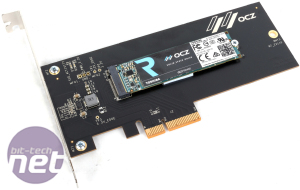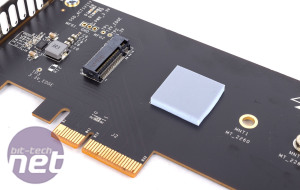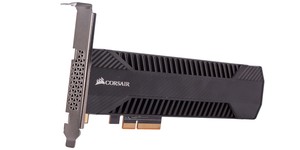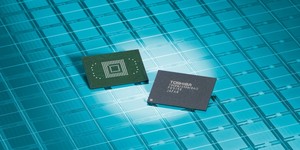Toshiba OCZ RD400 Review (512GB)
August 18, 2016 | 11:46
Companies: #ocz #ocz-storage-solutions #toshiba

Toshiba OCZ RD400 Review (512GB)
Manufacturer: Toshiba OCZUK price (as reviewed): RD400 512GB: £259.99 (inc VAT); RD400A 512GB: £314.99 (inc VAT)
US price (as reviewed): RD400 512GB: $309.99 (ex Tax); RD400A 512GB: $329.99 (ex Tax)
OCZ has historically been synonymous with high-speed PC storage. Arguably one of the pioneers of the solid-state drive (SSD) revolution, OCZ, in recent times, has undergone a number of branding and ownership changes.
Keen to shake off a chequered past, OCZ is now simply a brand within Toshiba's catalogue. Continuing the theme of putting out drives with impressive specifications, often at the vanguard of consumer storage development, Toshiba OCZ, as it is now known, recently launched the RD400 line of NVMe PCI-E SSDs. Ostensibly the OCZ RevoDrive 400 renamed, it's available in four sizes - more than any other consumer PCI-E SSD currently available.
| Toshiba OCZ RD400 | 128GB | 256GB | 512GB | 1TB |
| Max Sequential Read | 2,200MB/sec | 2,600MB/sec | 2,600MB/sec | 2,600MB/sec |
| Max Sequential Write | 620MB/sec | 1,150MB/sec | 1,600MB/sec | 1,550MB/sec |
| Max Random Read (4K QD32) | 170,000 IOPS | 210,000 IOPS | 190,000 IOPS | 210,000 IOPS |
| Max Random Write (4K QD32) | 110,000 IOPS | 140,000 IOPS | 120,000 IOPS | 130,000 IOPS |
Being a premium drive, the RD400 uses multi-level cell (MLC) NAND technology. The usual SATA-imposed speed barrier is broken because it uses a PCI-E 3.0 x4 interface offering up near-4GB/s bandwidth. Read speeds are impressive across the capacities, though enthusiasts after excellent write speeds need to look at 256GB-plus models that routinely exceed 1GB/s on sequential write transfers. Putting the RD400 into context, the speeds are similar to what Samsung achieves with the popular SSD 950 Pro and SM951 drives.
The RD400 is presented in the now-familiar M.2 2280 form factor, though OCZ increases compatibility beyond what Samsung offers by adding an optional PCI-E adaptor add-in card (AIC). In this form factor, the drive becomes known as the RD400A, and carries a slight premium over the standard M.2 RD400. These aren't value offerings, of course, with pricing starting at £120 and rising to a colossal £600. One other thing to note is that while the PCI-E AIC is black, and the M.2 drive has a black sticker on, the actual M.2 PCB is not black - perhaps less appealing to anyone looking for colour co-ordination in their build.
A closer look at the 512GB review model shows a couple of Toshiba 15nm NAND chips next to a controller referred to as TC58. We know that it has also been used in previous OCZ drives such as Trion 100 and 150, though the company has added NVMe support this time around. We're a little surprised that a newer, faster controller hasn't been used. The benchmarks will show whether the drive is being hamstrung by using extant technology. A Samsung chip, on the right, is used for the usual array of buffering duties.
| Toshiba OCZ RD400 Specs | 128GB | 256GB | 512GB | 1TB |
| Interface | PCI-E Gen 3.0 x4 | |||
| Formatted capacity | 111.79GiB | 223.57GiB | 447.13GiB | 894.25GiB |
| Controller | Toshiba TC58 | |||
| NAND dies | 256Gbit Toshiba A15nm MLC | |||
| DRAM | Samsung DDR3L-1600 | |||
| Endurance | 74 TBW (~40GB/day) | 148 TBW (~81GB/day) | 296 TBW (~162GB/day) | 592 TBW (~324GB/day) |
| Warranty | Five years | |||
The endurance doubles along with the capacity, and it's good to see Toshiba OCZ offer a five-year warranty that has its Advanced Warranty Program baked in. In a nutshell, should the drive fail and a replacement be deemed necessary by tech support, a pre-paid label will be issued and a brand-new replacement sent the next business day. The defective drive is then returned, minimising the potential downtime. This was previously known as the ShieldPlus warranty, and gives Toshiba OCZ a slight advantage over rivals Intel and Samsung where the five-year warranties carry more standard terms and conditions.
Thermals have been an issue on some high-performance M.2 2280 SSDs. The Toshiba OCZ RD400 is claimed to run at a peak 6W for this 512GB model. Sensibly, the add-in card features a thermal pad that connects to the mated drive. We didn't notice any obvious performance slowdowns during testing, with or without the card.
There isn't much information on the security aspects of the drive; OCZ provides scarce little details. In this regard, the RD400 isn't as strong as the competition, notably from Samsung, although the promised firmware update for the SSD 950 Pro enabling TCG Opal encryption still appears to be absent, so perhaps the difference isn't so great.

MSI MPG Velox 100R Chassis Review
October 14 2021 | 15:04











Want to comment? Please log in.